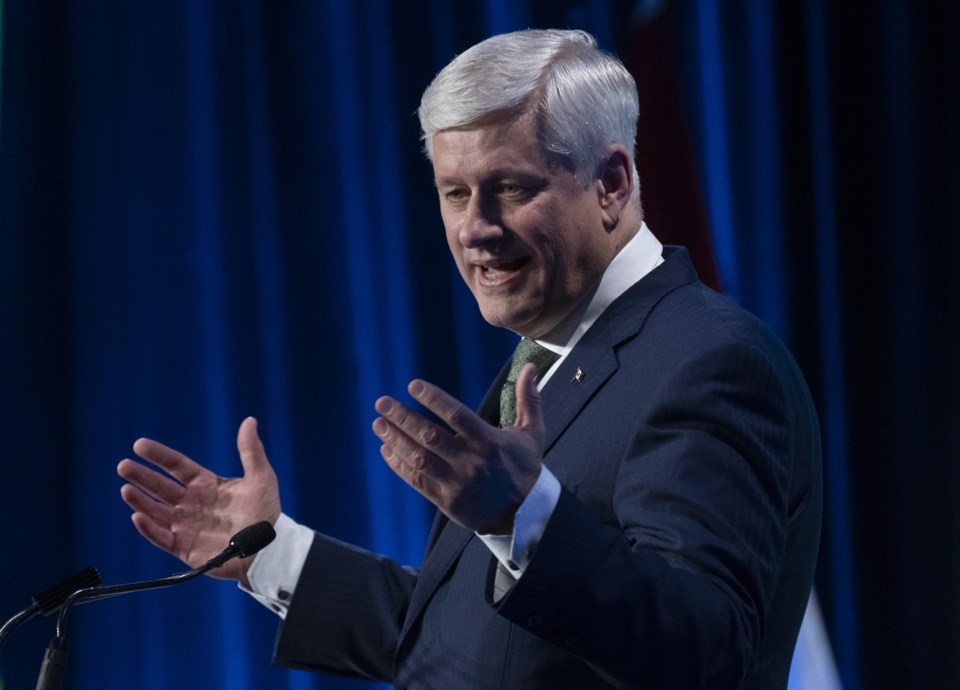OTTAWA — Former prime minister Stephen Harper said Friday the best way to build much-needed infrastructure in the Arctic is through military spending.
Speaking in Iqaluit during his first visit to the North since leaving office, Harper said leveraging military spending can build roads and runways to create supply chains and lower the cost of living.
"We need to have the full range of transportation and communications infrastructure ... quite frankly, the easiest way to develop those logistics is through military development," Harper said during a fireside chat at the Nunavut Arctic Sovereignty and Security Summit.
He said military spending has long been a catalyst for building roads and airports in the North. Iqaluit is built around an 8,000-foot airport runway constructed by the U.S. military during the Second World War.
"This is the biggest and most effective way to create the most basic, wide ranging infrastructure," Harper said.
"And if we can do that and then build on that, that makes it then so much easier to bring in materials for construction, or economic development, or fly in food. Get things at a critical mass where prices can come down. Build housing more effectively."
Canada recently committed to NATO's new military spending target of five per cent of GDP. Federal officials have spoken in recent years about linking northern infrastructure to defence spending
Canada's defence strategy committed to building Northern Operational Support Hubs, which would involve upgrades to power and telecommunication infrastructure. Iqaluit was announced as one of the hub locations in March.
Udlariak Hanson, a longtime Nunavut executive and vice-president of the mining company Baffinland, moderated the conversation with Harper. She said the terms "security" and "sovereignty" mean different things in the North than in southern Canada.
"You're absolutely right," Harper said. "For people here, when you talk about security, they're talking about food security, about housing security, about energy security. I don't think southern Canadians generally understand that.
"Quite frankly, when you talk about security in the north, what southern Canadians are going to hear is obviously Donald Trump talking about annexing Canada, and probably even more relevant to here is Donald Trump talking about annexing Greenland."
Harper said the key is to "marry" the two definitions of sovereignty and security to build infrastructure that satisfies the social security needs of the North and broader national security concerns.
Throughout the 45-minute chat, Harper avoided commenting on current government policy and reflected on how he approached the region while in office.
"I think the most important thing we did here was the fact that I actually came here ... in one marquee tour that I took every year to the North, which really was I think effective longer-term in drawing sustained national attention to this part of the country," he said.
"I think that is the most important thing for future prime ministers to continue to do, to come here and make sure Canadians understand that we have not done what is necessary to develop this part of the country. And when we talk about it as the great future hope of Canada, there is a lot more to be done to make that realized."
He didn't comment on the recently-passed Bill C-5, which could lead to one or more of Nunavut's proposals for "projects of national interest" being fast-tracked. He did offer some advice for the Liberal government when prompted.
"Try and take a broader long-term view," he said, recalling how eyes would roll in Ottawa when his government proposed building a port in Iqaluit, or the Canadian High-Arctic Research Station in Cambridge Bay, Nvt., or the highway to Tuktoyaktuk, N.W.T.
"And I always used to say, these are the things, the nation-building things are the things that people will remember," he said. "They're the things that will define your time in government.
"Don't get hung up on the dollars today, or kind of the immediate needs. Think about what you're doing in terms of the bigger picture."
This report by The Canadian Press was first published June 27, 2025.
Nick Murray, The Canadian Press



